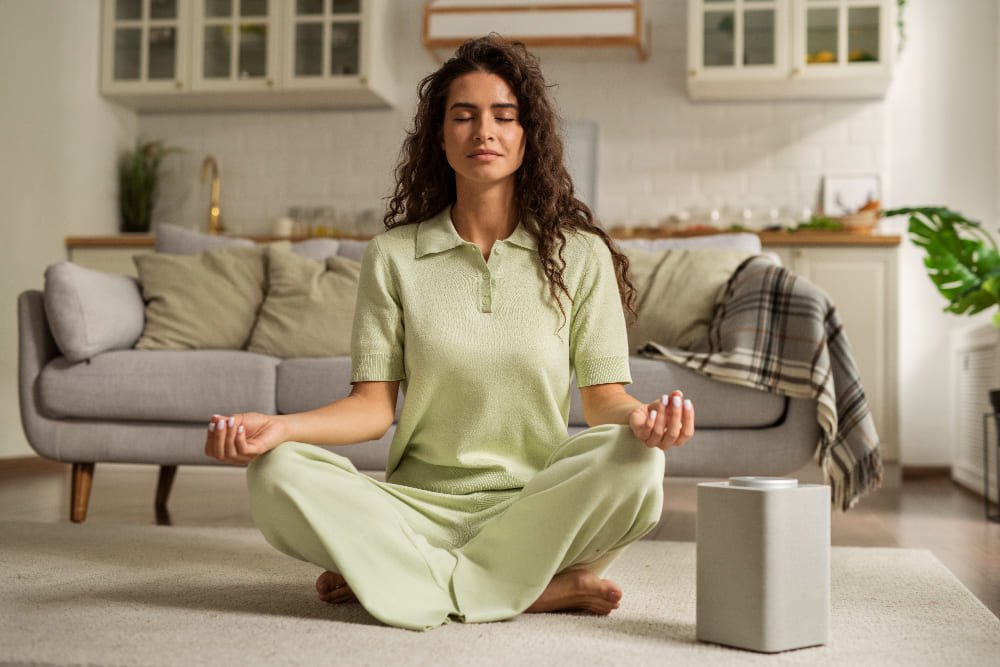Do you often feel overwhelmed and stressed out at home? Okay, take a deep breath in, hold for a few seconds, and then release slowly. Repeat this process a few times while focusing on the present moment.
You have just practiced mindfulness, a simple yet powerful way to calm your mind and body. Don’t need to go anywhere or spend any money to practice mindfulness. You can do it right at home, in the comfort of your own space.
Today, I will be sharing some mindfulness practices that you can easily incorporate into your daily routine. And trust me, they will make a huge difference in your overall well-being.
Related Reading: Easy Relaxation Techniques: How to Find Your Inner Calm
What is Mindfulness?
First, let’s take a moment to understand the concept of mindfulness. Mindfulness is the practice of being fully present and aware of our thoughts, feelings, bodily sensations, and surroundings without any judgment.
It is about focusing on the present moment rather than dwelling on the past or worrying about the future. It helps us to become more aware of our thoughts and emotions, which in turn allows us to better manage them.
Benefits of Mindfulness
Now that we know what mindfulness is let’s talk about its benefits. Practicing mindfulness has been proven to have numerous physical and mental health benefits, such as:
- Reducing stress and anxiety
- Improving focus and concentration
- Building self-awareness and boosting emotional intelligence
- Improving sleep quality
- Boosting immune system
- Increasing feelings of happiness and well-being


Mindfulness Practices at Home
Here are some simple yet effective mindfulness practices that you can incorporate into your daily routine at home.
Mindful Breathing
Our breath is a powerful tool to help us become more present and calm our minds. Take a few minutes every day to sit in a comfortable position, close your eyes, and focus on your breath. Feel the gentle flow of air as it enters and leaves your body. If any thoughts come up, acknowledge them without judgment and then gently bring your focus back to your breath.
Gratitude Practice
Gratitude is an essential aspect of mindfulness, as it helps us appreciate the present moment and all the good things in our lives. Take a few moments every day to think about three things that you are grateful for. It could be something as simple as having a roof over your head or a warm cup of tea.
Mindful Eating
Eating mindfully can help us develop a healthier relationship with food and appreciate the flavors and textures of our meals. Before eating, take a moment to observe your food, smell it, and notice how it makes you feel. While eating, savor each bite and pay attention to the taste, texture, and sensations in your body.


May Like: 10 Tips for Maintaining Healthy Eating Habits on a Budget
Mindful Movement
You don’t need to practice intense workouts or yoga poses to incorporate mindful movement into your routine. Simply take a few minutes to stretch your body and focus on how it feels. You can also try activities like gardening or cleaning mindfully by paying attention to each movement and sensation.
This practice can help you become more present and reduce stress and tension in your body. Many people also find walking or jogging mindfully in nature to be very calming and rejuvenating.
Digital Detox
This may be a challenging practice for some, but taking a break from technology and social media can do wonders for our mental well-being. We often get caught up in the digital world and lose touch with the present moment. Take some time every day to disconnect from your devices and engage in activities that bring you joy.
For example, you can read a book, listen to music, or spend quality time with your loved ones without any distractions. This will not only help you become more mindful but also improve your relationships.
Mindful Reflection
Take a moment at the end of the day to reflect on how it unfolded. This can enhance your awareness of your thoughts, emotions, and actions. You can also journal about your day, which can be a great way to release any stress or worries and improve self-awareness.
Tips for Incorporating Mindfulness into Your Daily Routine
- Start small and be consistent. You don’t need to spend hours practicing mindfulness, a few minutes every day can make a significant impact.
- Choose a comfortable, quiet location where you can concentrate without interruptions.
- Be patient with yourself, It takes time to develop a habit, so don’t get discouraged if you find your mind wandering during your practice.
- Set reminders or incorporate mindfulness practices into daily activities like brushing your teeth or cooking.
- Remember that it is okay to have thoughts and emotions arise during your practice. The key is to acknowledge them without judgment and then gently bring your focus back to the present moment.


My Mindfulness Journey
I started incorporating mindfulness practices into my daily routine a few years ago, and it has made a significant difference in my life. I used to struggle with stress and anxiety, but now I am better equipped to manage them.
Mindfulness has also helped me become more self-aware and appreciate the little things in life. It has become an essential part of my self-care routine, and I highly encourage everyone to give it a try.
Final Thoughts
Mindfulness practices at home provide an excellent opportunity to bring a sense of peace and calm into your daily life. With a bit of consistency and patience, these practices can help you stay more present, cut down on stress and anxiety, and boost your overall well-being.
Why not give it a chance and experience the positive impact it could have on your life? You’ll be surprised how a few minutes of mindfulness can make a big difference.
Frequently Asked Questions (FAQs)
Can mindfulness help with mental health issues?
Yes, research has shown that practicing mindfulness can have positive effects on managing conditions such as anxiety, depression, and stress.
Must I be religious or spiritual to practice mindfulness?
No, mindfulness is a secular practice that anyone can incorporate into their daily routine regardless of their beliefs.
How often should I practice mindfulness?
Ideally, it would be best to practice mindfulness daily for a few minutes. However, even practicing once or twice a week can have significant benefits.
Can I practice mindfulness while doing other activities?
Yes, you can incorporate mindfulness into any activity by focusing on your breath, senses, or thoughts in the present moment.
Is mindfulness difficult to learn?
Mindfulness is a simple practice, but it does take time and patience to develop. Start with small steps and be consistent, and you will gradually see improvements.
Can mindfulness improve relationships?
By being more present and aware of our thoughts and emotions, we can communicate better, listen actively, and build stronger connections.
